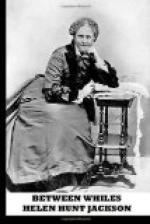Katie’s heart beat like a hammer in her bosom at these words, but she answered gravely: “Yes, it was sorely lonely at first, an’ I wearied myself out to get them to give me Elspie to learn the business wi’ me; but I’m more used to it now.”
“That is what I was thinkin’,” said Donald, “that if the two o’ ye were here together, ye’d not be so lonely. Would she not like to come?”
“Ay, that would she,” replied the unconscious Katie; “she pines to be with me. I’m more her mother than the mother herself; but they’ll never consent.”
“She’s bonny,” said Donald. I’d not seen her since she was little.”
“She’s as good as she is bonny,” said Katie, warmly; and that was the last word between Katie and Donald that night.
“As good as she is bonny.” It rang in Donald’s ears like a refrain of heavenly music as he strode away. “As good as she is bonny;” and how good must that be? She could not be as good as she was bonny, for she was the bonniest lass that ever drew breath. Gray eyes and golden hair and pink cheeks and pink heather all mingled in Donald’s dreams that night in fantastic and impossible combinations; and more than once he waked in terror, with the sweat standing on his forehead from some nightmare fancy of danger to the “Heather Bell” and to Elspie, both being inextricably entangled together in his vision.
The visions did not fade with the day. They pursued Donald, and haunted his down-sitting and his uprising. He tried to shake them off, drive them away; for when he came to think the thing over soberly, he called himself an old fool to be thus going daft about a child like Elspie.
“Barely twenty at the most, and me forty. She’d not look at an old fellow like me, and maybe’t would be like a sin if she did,” said Donald to himself over and over again. But it did no good. “As good as she is bonny, bonny, bonny,” rang in his ears, and the blue eyes and golden hair and merry smile floated before his eyes. There was no help for it. Since the world began there have been but two roads out of this sort of mystic maze in which Donald now found himself lost,—but two roads, one bright with joy, one dark with sorrow. And which road should it be Donald’s fate to travel must be for the child Elspie to say. After a few days of bootless striving with himself, during which time he had spent more hours with Katie than he had for a year before,—it was such a comfort to him to see in her face the subtle likeness to Elspie, and to hear her talk about plans of bringing her to Charlottetown for a visit if nothing more,—after a few days of this, Captain Donald, one Saturday afternoon, sailing past Orwell Head, suddenly ran into the inlet where he had taken the picnic party, and, mooring the “Heather Bell” at Spruce Wharf, announced to his astonished mate that he should lie by there till Monday.
It was a bold step of Captain Donald’s. But he was not a man for half-and-half ways in anything; and he had said grimly to himself that this matter must be ended one way or the other,—either he would win the child or lose her. He would know which. Girls had loved men twenty years older than themselves, and girls might again.




